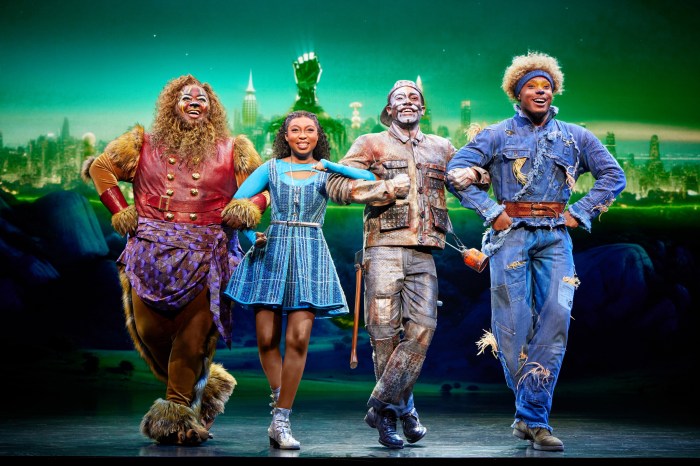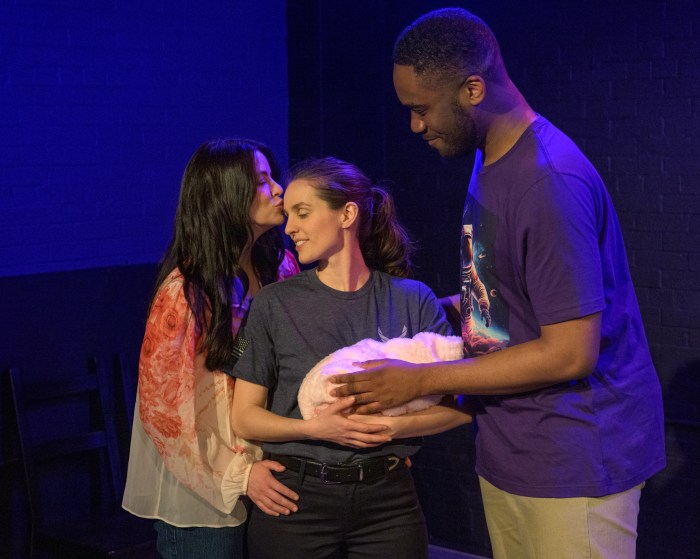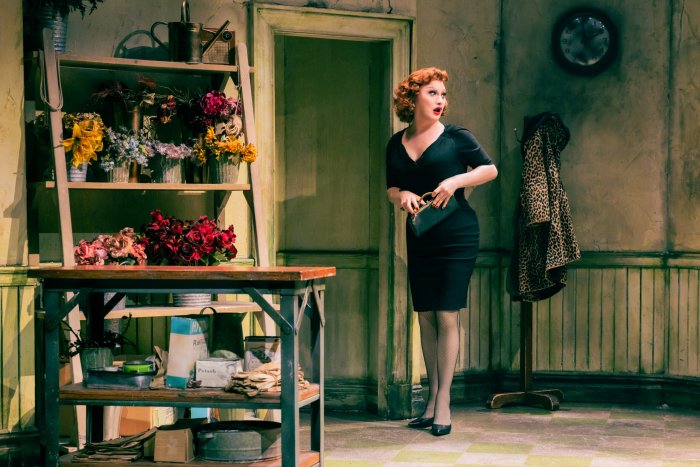Frances de la Tour in Alan Bennett’s “People” at the National. | CATHERINE ASHMORE
The crown jewels and Magna Carta are two of the most famous national treasures on display in London. But there are also uniquely British people who are valued in much the same fashion — not because they led a battle or won Olympic gold, but for epitomizing something about being British that the public cherishes.
Two of them, who just happen to be gay men — playwright Alan Bennett and actor and writer Stephen Fry — are represented on the West End stage along with (pardon my superlatives) three of the greatest actors in the English-speaking world: Simon Russell Beale, Frances de la Tour, and Mark Rylance. This is not to mention two of the greatest directors — the National Theatre’s Nick Hytner and former Donmar artistic director Michael Grandage, who now has his own company.
The rest of my theater during a rainy Yuletide wasn’t too shabby. And if you’re not headed for London soon, several of the shows from the National will soon be shown in cinemas worldwide through its NT Live transmissions.
Bennett’s new play, directed by Hytner, is “People,” with de la Tour in great form at center stage as the Lady of an historic house built in 1465 that is coming down around her ears. The drama is about the house’s fate —National Trust? Corporate HQ? Simply allowed to decay? — but the play is a thoughtful exploration of the valuing, even fetishizing of old objects over living people. It is funny and illuminating, often at the same time, full of Bennettian aphorisms and declarations about contemporary English culture.
This is “Grey Gardens” not with crazy people, but with those who decidedly do not love people who — it is suggested — have a way of spoiling Things.
“People” (on stage through Apr. 2) will be shown in cinemas worldwide at part of NT Live in late March. Visit ntlive.com for a full schedule.
Stephen Fry as Malvolio in “Twelfth Night” at the Apollo. | SIMON ANNAND
Bennett himself is being portrayed at the National in two short curtain-raisers in the Lytteleton by the estimable Alex Jennings in “Hymn” (through Mar. 17) and in the one I saw, “Cocktail Sticks” (through Mar. 30), about his parents and his youthful embarrassment at their ordinariness. Jennings deftly steers through keen observations and interactions acerbic, comedic, and heartbreakingly touching. A treat.
Stephen Fry is ubiquitous in Britain as a writer, tweeter with millions of followers, social commentator, director, panel show host, and emcee of big award ceremonies. He makes a rare stage appearance as Malvolio in the all-male, Elizabethan “Twelfth Night” transferred from Shakespeare’s Globe to the Apollo in the West End. Mark Rylance, who alternates at the Apollo as “Richard III” — a lacerating production I saw at the Globe this past summer — here reprises his hilarious turn as Olivia-by-way-of-Elizabeth I that I saw some years ago. Tim Carroll directs both, giving us at least the feeling Elizabethan audiences might have had seeing these masterpieces for the first time.
This “Night” (through Feb. 9) is blessed by a super funny Sir Toby Belch (Colin Hurley) — a drunk just shy of Foster Brooks — and Sir Andrew Aguecheek (Roger Lloyd Pack). But Fry as Malvolio is the most recognizably human character on stage — not overplayed to earn our contempt or our enjoyment at his downfall. We feel for the bullying he endures.
Phyllida Lloyd’s “Julius Caesar” at the Donmar is about as far from Elizabethan as you can get, not because of the all-woman cast who play the text straight right down to the pronouns (save for a few well-placed F-words) but because this is “Caesar” (through Feb. 9) in a modern prison — a provocative concept that I’m still conflicted about, especially after being confined with this strident group for just under two hours without a break except for some ear-piercing rock music.
Harriet Walter as Brutus in the Donmar production of “Julius Caesar.” | HELEN MAYBANKS
Harriet Walter, who shone on Broadway in “Mary Stuart,” makes a noble Brutus, but there’s an emphasis on youth among the Senators who take down Caesar (a pugnacious Frances Barber) that I’m not sure works. The audience cheered it and I won’t soon forget it. “Liberty! Freedom! Tyranny is dead!,” Cinna (Carolina Valdés) shouts when Caesar falls — realities in short supply in ancient Rome and absent entirely in gaol.
“Privates on Parade” may sound like a porn film, but while the humor is low the quality of the work is high in this revival starring Simon Russell Beale and directed by Michael Grandage for the maiden production of his new eponymous company’s season at the Noel Coward Theatre. Peter Nichols sends up his tour of duty in the Malay Peninsula in 1948, when Britain was losing the peace after winning the war. He tells this seriocomic tale-with-music through a troop/ troupe of soldier-performers partial to drag and led by Beale’s campy captain. There is much banter about “bum boys” and “homos,” some gratuitous bare bums, and some gay and interracial romance.
While I was expecting non-stop hilarity, I got more of a lesson in history — political, social, racial, and sexual. And Beale’s bit as Noel Coward is a gem amidst his broader takes on female icons. (Through Mar. 2.)
Pip Carter as Edward Thomas and Shaun Dooley as Robert Frost in “The Dark Earth and the Light Sky” at the Almeida. | NOBBY CLARK
I got another lesson in British history — this time literary — from “The Dark Earth and the Light Sky” by Nick Dear, who gave us the hit “Frankenstein” at the National last season, and directed by Richard Eyre, a distinguished former artistic director of the National. At the Almeida, they bring to life the short life of poet Edward Thomas (in an unflinching and unsettling performance by Pip Carter) — hitherto unknown to me — a writer whose criticism established Robert Frost (Shaun Dooley) prior to World War I and whose relationship with Frost sparked a couple of years of what is regarded as remarkable poetry by Thomas himself, a man who loves Nature and seems to hate People, despite being married with kids.
This is no walk in the country, but a slog over the dark earth that constitutes the playing field of Bob Crowley’s design. We learn the tragedy of Thomas’ life early on: he volunteered for the front in France in the war — even though he did not have to serve — and he died there, delivering a final cruel blow to his wife Helen (Hattie Morahan, who well handles the challenging role of someone who loves too much and is repaid with indifference). It is not an easy drama to watch, but it did make me want to read Thomas’ poetry and re-read Frost’s — a compliment to all hands. (Through Jan. 12.)
E.V. Crowe stunned with foul-mouthed ten-year olds in “Kin” at the Royal Court, where she is back with “Hero,” also directed by Jeremy Herrin, in which the bad seed kids — gaybashers this time — are off stage, as adults grapple with the problem of being out as a grade school teacher. But what seems like a straightforward issue play about the consequences of what is still a rare — but not disallowed, as one character suggests — thing to do, is an intriguing dissection of an ostensibly straight married teacher, Jamie (Daniel Mays of Mike Leigh film fame), coping with gay envy. Jamie’s mania is contrasted with the centeredness of his gay colleague Danny (a winning Liam Garrigan), as they each spar with their respective spouses (Susannah Wise and Tim Steed).
The Royal Court has produced some hit gay-themed plays out of this little upstairs Jerwood Theatre — “The Pride” and “Cock,” which both enjoyed solid New York runs. “Hero” (just closed) may well follow in their footsteps.
After taking in Martin Crimp’s new “In the Republic of Happiness,” I boarded the District Line to Barking thinking about a play that didn’t amount to much more than that. While Bennett knows how to craft a thoughtful drama out of the everyday, the random thoughts put in the mouths of his able cast playing a dysfunctional family do not a play make. Echoes of Pinter and Beckett remind us that they knew what they were doing and Crimp does not. I say all this despite having my surname invoked about 50 times in the last scene.
Hearing scatological terms emanate from cultured Grandma earns the occasional titter, but it is not worth being abused for almost two hours sans interval. (Through Jan. 19.
John Lithgow and Joshua McGuire in “The Magistrate,” directed by Timothy Sheader, at the National. | JOHAN PERSSON
Kudos to the National for trying to breathe new life into old comedies. They scored big with “One Man, Two Guv’nors,” based on a 1745 Goldoni play, and Boucicault’s 1841 “London Assurance” with Beale. “The Magistrate” (1885), by Arthur Wing Pinero, gets the full National treatment on the big rotating Olivier stage — direction by award-winning Timothy Sheader and big inventive design by Katrina Lindsay, with one of our great comic actors, John Lithgow, imported for the title role.
It’s a funny situation — a woman keeping the age of her 19-year old son a secret (he actually believes he’s 14) to hide her real age from her new, older husband (Lithgow). The kid (Joshua McGuire) is the best thing in it, bursting out of his kids’ clothes and constantly reaching for the nearest drink, smoke, and woman. But it rarely achieves the hilarity such farce must to succeed. You can judge for yourself. “The Magistrate” (on stage to Feb. 10) will be shown as part of NT Live in January, including several venues in New York on Jan. 12, 18, 25, and 27.
Holly Dale Spencer as Lois Lane and Alex Garcia as Bill Calhoun in “Kiss Me, Kate” at the Old Vic. | CATHERINE ASHMORE
I capped off the week with a pilgrimage to the Old Vic, where Kevin Spacey is winding up a creditable stint as artistic director, to see its hit “Kiss Me Kate” (through Mar. 13), directed by Trevor Nunn, the king of big musicals. Spacey notes that this “is our first musical” (I assume for this season since the theater goes back to 1818) and what a one to pick — Cole Porter's 1948 comeback in a production that is sheer theatrical joy. While the show may come “out o' a hat,” as Porter's lyric has it, the inspired sets by Robert Jones spring from small boxes on the stage.
Hannah Waddingham and Alex Bourne excel in voice and acting as the dueling divorced leads, Lilli Vanessi and Fred Graham, but this is a show where many supporting roles take center stage — from the deadpanning gangsters (brilliant Clive Rowe and David Burt) to Wendy Mae Brown as Miss Vanessi's dresser, Hattie. Throw in great dancing by Adam Garcia as gambling Bill Calhoun and Holly Dale Spencer as the comic Lois Lane (the lovers who can't behave) and you've got a show Broadway should welcome (though some will not want to replace the memory of Brian Stokes Mitchell in 1999). Every other number is a showstopper — an embarrassment of riches, especially considering how little some shows deliver these days.
Coming up in the West End: Harold Pinter’s “Old Times” with Kristin Scott Thomas and Rufus Sewell at the Pinter (Jan. 12-Apr.6); “Our Country’s Good” at the St. James (Jan.30-Mar. 9); Betty Buckley at the Charing Cross Theatre (Feb. 4-Mar. 13) doing Jerry Herman’s “Dear World”; Helen Mirren returns to playing Elizabeth II in “The Audience” by Peter Morgan, who wrote the movie “The Queen” (Feb. 15-Jun. 15); Arthur Wing Pinero’s “Trelawny of the Wells” at the Donmar (Feb. 15-Apr.13); Jonathan Harvey’s gay classic “Beautiful Thing” at the Arts (Apr. 13-May 25); and Michael Grandage’s company follows “Privates on Parade” with “Peter and Alice” with Judi Dench and Ben Whishaw (Mar. 9-Jun. 1), then Daniel Radcliffe in “The Cripple of Inishmaan (Jun. 8-Aug. 31), “Midsummer Night’s Dream” with Sheridan Smith (Sep. 7-Nov. 16), and, finally, Jude Law’s “Henry V” (Nov. 23-Feb. 15, 2014). For more information, visit MichaelGrandageCompany.com.
For complete information on these shows and others running and upcoming in London, visit londontheatre.co.uk.







































